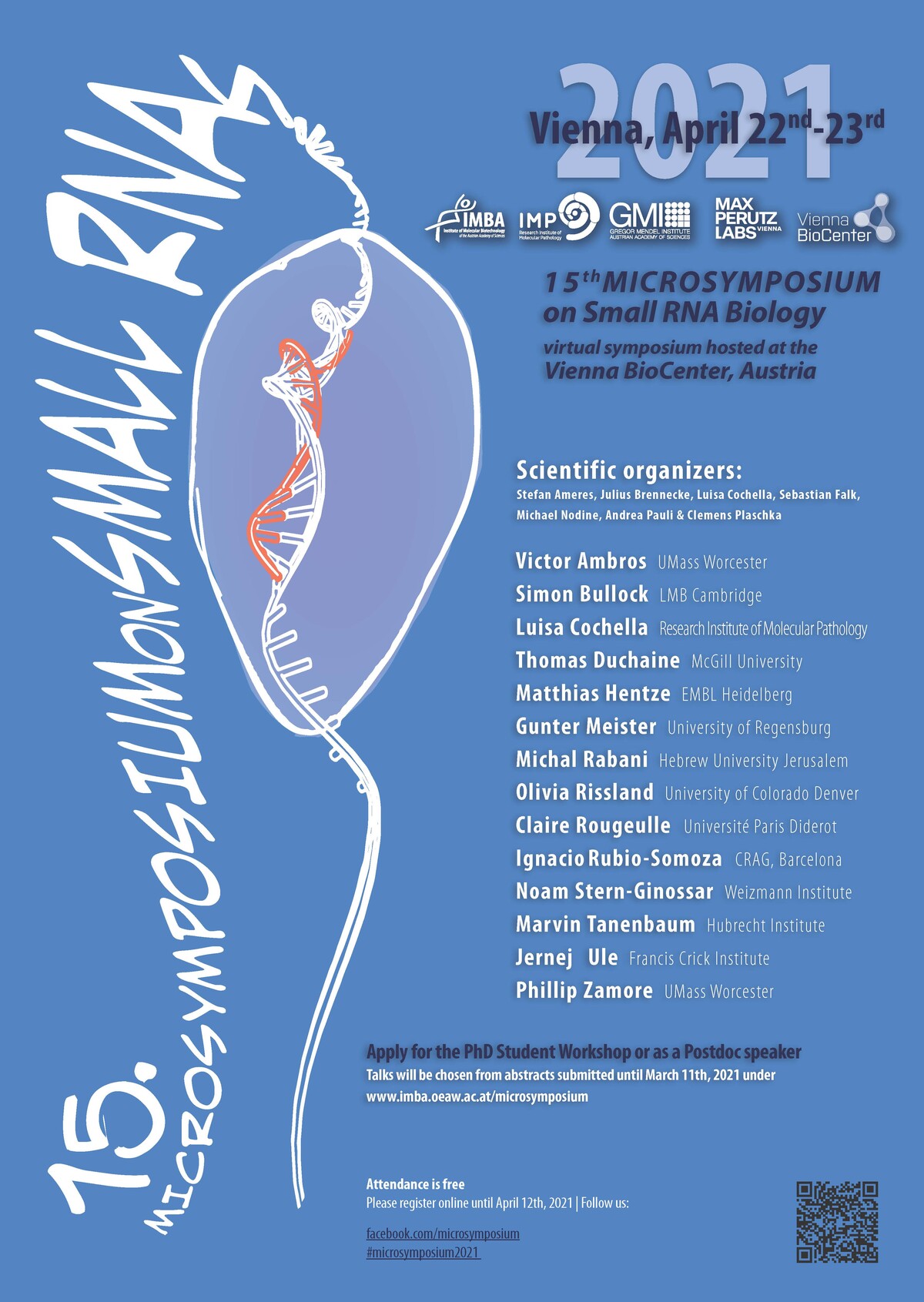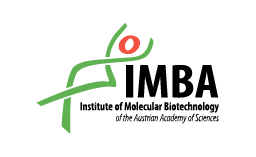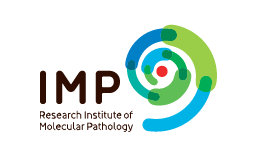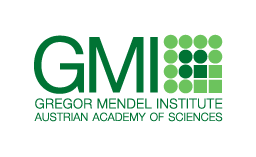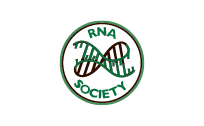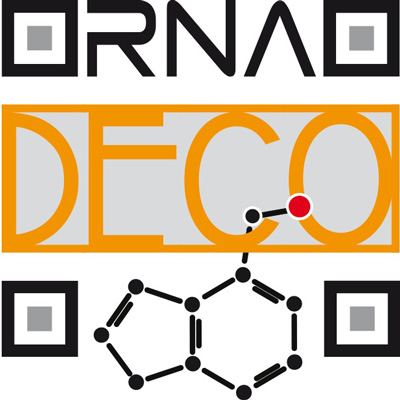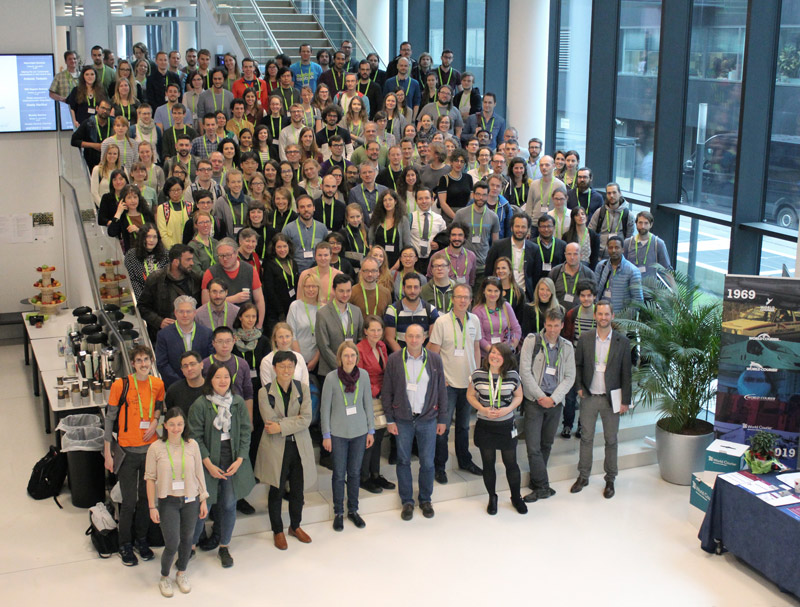
Dear Microsymposium aficionados,
We were hoping to be able to welcome everybody in Vienna for the 2021 meeting and celebrate with you the 15th anniversary of this event in person. However, the current coronavirus situation still does not allow us to physically meet. Therefore, we decided to continue the conversation in the virtual space and invite you to meet us on April 22nd till 23rd 2021 between 1 to 9 pm Central European Time (CET).
This year’s Microsymposium will differ in more ways than one. We shortened the meeting to two days, decided to skip the poster sessions and focus on short live talks.
All talks will be live followed by a live Q&A session. Please note that talks will not be recorded so make sure to join the talk on time! In addition, each speaker will be available during the networking break (on the day of her or his talk) for further discussion. You will be able to talk to them in small groups and face to face via video chat in the networking space.
Further details will follow closer to the symposium.
As in previous years we highly encourage PhD students and Postdocs to submit their abstract to apply for the PhD workshop or a Postdoc talk. Note that the submission deadline is March 11th.
To stay updated, leave your Email address here, and make sure to follow the official event hashtag #microsymposium2021
If you have any questions please contact the event coordinator: lea.klement(at)imba.oeaw.ac.at
The symposium will be held at CET (Central European Time), make sure you have the correct time! For example you can use this link: https://time.is/compare
Day 1 - THURSDAY April 22, 2021
13:00 Welcome & introduction
Session 1 - Development 1
Chair: Julius Brennecke
13:15 Victor Ambros, University of Massachusetts Medical School
Modelling in C. elegans ALG-1 of hAgo1 mutations that cause neurodevelopmental disorders in humans: Global disruption microRNA function and downstream gene expression.
13:35 Jeffrey Vedanayagam, Memorial Sloan-Kettering Cancer Center
Red queen and the lost boys: The role of RNAi in defending sex chromosome conflict
13:55 Michal Rabani, The Hebrew University Jerusalem
Kill the messenger: dynamic regulation of maternal mRNA degradation in embryos
14:15 break
Session 2 – Localisation
14:30 Chair: Clemens Plaschka
14:35 Simon Bullock, MRC Laboratory of Molecular Biology
Cargo-directed regulation of microtubule-based mRNA transport
14:55 Miha Modic, The Francis Crick Institute
Epiblast morphogenesis is controlled by selective mRNA decay triggered by LIN28A relocation
15:15 break
PHD WORKSHOP 1
Chair: PHD students
15:30 Katarina Meze, Cold Spring Harbor Laboratory
The 3’-5’ exonuclease Dis3l2 undergoes conformational dynamics during structured RNA degradation
15:45 Mateusz Mendel, University of Geneva
m6A RNA methylation regulates pre-mRNA splicing by blocking 3′ splice site recognition by the splicing factor U2AF35
16:00 Danyan Li, Yale University
Planarian PIWI guides tissue-specific chromatin changes during cell differentiation
16:15 Samantha Ho, University of Massachusetts Medical School
Chk2 and UAP56 control of the ping-pong amplification machinery
16:30 Andrew Behrens, Max Planck Institute for Biochemistry
Dynamics of human tRNA repertoires as a function of cell identity
16:45 break
Session 3 - Translation
17:05 Chair: Javier Martinez
17:10 Gunter Meister, University of Regensburg
A novel tRNA modification pathway and its link to pancreatic cancer
17:30 Meetali Singh, Institut Pasteur
Translation and codon usage regulate Argonaute slicer activity to trigger small RNA biogenesis.
17:50 Noam Stern-Ginossar, Weizmann Institute of Science
The translational landscape in SARS-CoV-2 infected cells
18:10 long break
Session 4 - non-coding RNAs
18:55 Chair: Luisa Cochella
19:00 James Walker, John Innes Centre
Nurse cell-derived small RNAs define paternal epigenetic inheritance in Arabidopsis
19:20 Luca Gebert, The Scripps Research Institute
A viral RNA motif that hijacks microRNAs
19:40 Matthias Hentze, EMBL
How A Small RNA Riboregulates Human Autophagy
20:00 Networking
Day 2 - FRIDAY April 23, 2021
Session 5 - Argonautes
12:55 Chair: Stefan Ameres
13:00 Phillip Zamore, UMass Worcester
Adventures with the Argonautes
13:20 Martina Sauert, Lexogen GmbH
TraPR – Gel-free Isolation of Functional Small RNAs
13:30 Rajani Gudipatti, Friedrich Miescher Institute for Biomedical Research
Protease-mediated processing of Argonaute proteins controls small RNA association
13:50 break
Session 6 – MicroRNAs
14:05 Chair: Sebastian Falk
14:10 Marvin Tanenbaum, Hubrecht Institute
mRNA structural dynamics shape Argonaute-target interactions
14:30 Thomas Duchaine, McGill University
Enjoy the silences: Flexibility, compensation and specialization among miRNA-mediated silencing mechanisms in development
14:50 break
PHD WORKSHOP 2
Chair: PHD students
15:05 Riley Galton, California Institute of Technology
A somatic piRNA pathway regulates epithelial-to-mesenchymal transition of chicken neural crest cells
15:20 Jan Schreier, Institute of Molecular Biology
A novel sperm-specific compartment secures a cytoplasmic Argonaute protein for paternal epigenetic inheritance of small RNA-mediated gene silencing
15:35 Zuzana Loubalová, Institute of Molecular Genetics of the Czech Academy of Sciences
Golden hamster piRNAs are necessary for zygote development and establishment of spermatogonia
15:50 Nimit Jain, Stanford University School of Medicine
Transcription polymerase–catalyzed emergence of novel RNA replicons
16:05 Katrin Leesch, Research Institute of Molecular Pathology (IMP)
Storage and function of maternal ribosomes depends on conserved ribosome-associated factors
16:20 break
Session 7 - Small RNAs in Plants
16:40 Chair: Michael Nodine
16:45 Ignacio Rubio-Somoza,Centre for Research in Agricultural Genomics (CRAG)
An arms race at RNA silencing: the role of microRNA targets in plant immunity
17:05 Akihito Fukudome, Indiana University
Structure of RNA-DEPENDENT RNA POLYMERASE 2 and its implications for double-stranded RNA synthesis in RNA-directed DNA methylation
17:25 Sara Lopez-Gomollon, University of Cambridge
sRNAs and genomic shock
17:45 long break
Session 8 - Development 2
18:30 Chair: Andrea Pauli
18:35 Olivia Rissland, University of Colorado Denver
Control of RNA Binding Proteins During Early Embryogenesis
18:55 Claire Rougeulle, Epigenetics and Cell Fate centre, CNRS / Université de Paris
It’s not all about RNA: contribution of the noncoding genome to human X chromosome inactivation
19:15 Luisa Cochella, Research Institute of Molecular Pathology (IMP)
Roles of miRNAs in cell diversification
19:35 Closing remarks
19:50 Networking
Speakers
Victor Ambros, UMass Worcester
Simon Bullock, MRC Laboratory of Molecular Biology
Luisa Cochella, Research Institute of Molecular Pathology
Thomas Duchaine, McGill University
Matthias Hentze, EMBL Heidelberg
Gunter Meister, University of Regensburg
Michal Rabani, The Hebrew University Jerusalem
Olivia Rissland, University of Colorado Denver
Claire Rougeulle, Université Paris Diderot
Ignacio Rubio-Somoza, Centre for Research in Agricultural Genomics (CRAG)
Noam Stern-Ginossar, Weizmann Institute of Science
Marvin Tanenbaum, Hubrecht Institute
Jernej Ule, Francis Crick Institute
Phillip Zamore, UMass Worcester
Registration
The Microsymposium is entirely financed by biotech companies, scientific societies, leading journals, the city of Vienna, and the research institutions IMBA, IMP, and GMI. These generous contributions make the Microsymposium a registration-free meeting, which attracts in particular students and postdocs from all over the world.
Abstract deadline: March 11th 2021
Registration deadline: April 12th 2021
Abstract submission
To apply for the PhD workshop or a Postdoc talk, please send your abstract (ideally a WORD document) to: lea.klement(at)imba.oeaw.ac.at
The abstract should include:
Title:
Author(s) & Affiliation:
Abstract: (max. 300 words)
By submitting an abstract, you agree to have it published in the abstract booklet, which will be provided to all symposium participants.
About
The „Microsymposium on Small RNA Biology“ is an international conference that brings together young scientists, junior and senior group leaders, and company representatives from all over the world to present and discuss their latest findings in the exciting field of small RNAs. The Microsymposium was founded in 2005 and has established itself as the major small RNA meeting in Europe. It is organized by the four research institutions IMBA, IMP, GMI and the Max Perutz Labs as well as by the RNA community of the Vienna BioCenter.
In all three eukaryotic kingdoms, small regulatory RNAs play a key role in the silencing of gene expression at the post-transcriptional and the transcriptional level. They have central functions in the repression of viruses and transposons and they play essential roles in coordinating organismal development, physiological processes and human diseases, such as cancer.
To strengthen the focus on the new generation of scientists, the Microsymposium invites—besides established leaders in the field— postdocs and PhD students (selected from submitted poster abstracts) as speakers. This allows the up-and-coming scientists to present their projects and results to a highly qualified, engaged and dynamic audience and is a major distinguishing factor from other conferences.
ORGANIZING COMMITTEE
Stefan Ameres (IMBA & Max Perutz Labs)
Julius Brennecke (IMBA)
Luisa Cochella (IMP)
Sebastian Falk (Max Perutz Labs)
Javier Martinez (Max Perutz Labs)
Michael Nodine (GMI)
Andrea Pauli (IMP)
Clemens Plaschka (IMP)
Sponsors
We would like to thank the following companies who have kindly sponsored our symposium over many years.
